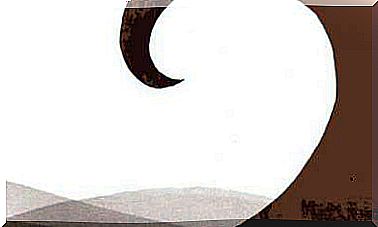How To Control Shame
This emotion has some utility to regulate social relationships, but its excess disables us, makes us suffer and undermines our self-esteem.

We are ashamed when we find ourselves inferior to others or when we violate the norms of behavior. Knowing how to handle it and, above all, avoid it for others, will make us feel more satisfied with ourselves.
When we feel ashamed
I lived this story one autumn, when I was a student and, to earn some money, I did the grape harvest in the south of France. Twenty or thirty people gathered for dinner the first night around a large table. There was a tureen in the middle of the table and the landlady served us.
Conversations were hardly heard, as people were tired and somewhat reserved. Just as I reached out to pick up my bowl of soup, a wasp landed on my hand, unnoticed, not even me, and stung me fiercely.
Moved by pain, I threw my plate into the air, which broke and splashed everyone. All faces turned to me and suddenly there was icy silence. There I was, with my empty and aching hand, looking at the plate fragments scattered around the table and the soup stains on the diners’ shirts.
At that moment I realized that it was going to be very difficult to explain to all those strangers that a wasp, which no one had seen, not even me, and which had disappeared, had bitten me and caused me to drop the plate. Great feeling of shame …
A feeling that undermines self-esteem
It is often said that shame is the emotion of inferiority, which is triggered every time we find ourselves at fault with respect to social norms or rules: dumping an object in a store, saying something silly, making noises with the belly …
Shame is a self-esteem wound and manifests itself with varying levels of intensity.
- To a minimal degree, we have embarrassment or rush, which are not necessarily destructive or painful moods, just a little uncomfortable: for example, receiving compliments in public.
- Other times, shame appears linked to a mistake or an inappropriateness of our behavior: slipping and falling, saying “stupid” or announcing as an exclusive something that everyone already knows.
- The feeling of ridicule is at a higher level and is associated with the conviction of having undermined one’s social image, or provoked mocking or ironic glances: having spent the morning with the fly open, or the afternoon with a piece of parsley in between. Etymologically, ridiculous comes from the same roots as laughing: to fear ridicule is to be afraid of making others laugh at us.
- Still on a step above, we can fall into intense and sick shame …
When shame is a hindrance
Psychology has studied guilt a lot, that feeling of painful discomfort linked to the intimate conviction of having committed a fault.
But shame is an even more devastating feeling, because it is linked to the person and not just the behavior.
You blame yourself for what you have done, but you are ashamed of what it is: the damage is more serious.
Thus, shame is always self-shame: the person rejects not only his actions but himself completely.
The expression “dead with shame” perfectly expresses the extent to which it is possible to feel bad.
Shame can be a problem if it is intense because it causes a lot of suffering and a kind of “double pain”:
- The negative social judgment of others. If it exists, then people are often much more forgiving than we think.
- The negative judgment we place on us. In general, we are our harshest critics.
Shame often leads to withdrawing into oneself, avoiding the gaze and contact of others, which aggravates it.
Psychotherapists take this very into account: it is known that victims of trauma – rapes, assaults, incest … – tend to be so ashamed of what they have suffered that they take a long time to dare to talk about it.
Should we lose our shame?
Still, shame is not always useless and toxic. Imagine what a world would be like where no one was ever ashamed, where no guest was uncomfortable for having broken an object, where no guilt was felt for making others suffer. It wouldn’t be nice or comfortable, would it?
In fact, shame plays a useful role in facilitating community life, and that is why it is universal in the human species: without it, social relations would be much harsher and more violent.
Our modern society no longer openly uses shame as an instrument of social regulation, but it did so in the past: in the town squares, those convicted of minor crimes were exposed in the pillory so that everyone would make fun of them; they survived, of course, but after such humiliation they had no desire to reoffend.
In schools, bad students with “donkey ears” were put in a corner; This was supposed to motivate them to work better, or at least not to disturb the work of others.
Our society has become more intolerant of public use of shame, and this is a good thing; but the feeling of shame and its good use are still useful on a personal level.
So let us not try to banish shame from the register of our moods.
Let’s not be afraid to feel it: it can help us see how far we should not go. We just have to try not to let ourselves be dominated by it.
Let us not allow it to isolate us: when we suffer for its cause, let us entrust it to our loved ones, without devaluing ourselves.
And above all, let’s try not to inflict it on others, humiliating them: shame manipulated like this and not self-produced does not lead to a desire for personal change but to one for revenge. The philosopher Nietzsche put it perfectly in The Gay Science :
“Who are you calling bad?”
“The one you always want to embarrass.”
“What do you consider most human?”
“Avoid embarrassment to someone.”
“What is the sign that freedom has been won?”
“No longer be ashamed of yourself.”
Just feeling a little uncomfortable from time to time is more than enough.









